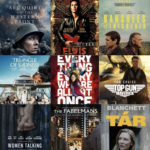From the WRGW Blog archives. Originally published on March 6, 2021.
By Jess Makler
Cover photo by Lacey Terrell
Racquel Jones. The word that comes to mind in describing her after our conversation is simply, resilient.
Racquel grew up in Jamaica with three brothers, her mother and father. Her mother was a preacher and her dad a farmer, and she knew from a young age she had a strong interest in music. She was drawn to the arts, attending school for visual arts and music, and eventually using her art as an outlet for her questions on the strict religious upbringing her family raised her with.
Racquel has a family intertwined with the church. Her aunts are pastors, her uncles are bishops and reverends. She grew up with evangelist cousins, prophets and deacons in a country with the most “churches” per square mile of any country in the world, with over 1,600 “churches” all over Jamaica.
As kids, Racquel and her brothers weren’t told regular stories.
“We were told Bible stories,” Racquel explains. “Granted, some of them were beautiful, and some of them have some of the greatest lessons and examples of love … but [the Bible] also taught me a lot about things that are contradictory to love.”
Racquel began to have questions about the stories she was told, and wished for a platform to get the answers she desired. She started to do her own research as she grew older, writing down her thoughts and feelings as poetry that eventually developed into the music she makes today.
“We are so blindly led by this thing, with no proof of a lot of it, with proof that it has hurt us, with proof that it has divided us, with proof that it is connected to the deepest darkest part of our history,” Racquel said.
The journey hasn’t been easy. Racquel has had to learn to balance her quest for truth with her relationship with her family, having difficult conversations with her parents about her use of curse words in her music.
“I had to tell [my mother], you raised me how you raised me, now allow me the freedom to make my own decisions.”
“I figured, you know, it’s only right that I stop being fearful, stop being cautious, and start being truthful about the things that I think are true to me and how I really feel about them. I thought that I’d be doing a disservice to the legacy of my ancestors if I sit and be quiet, because had they done that, I would not have been here.”
Racquel’s newest track, Sacrilege examines her relationship with religion, with a catchy hook and magnetic verses. The track has received backlash, but to Racquel, it’s mild compared to what she’s faced previously.
“They censor what they want to censor, they censor what is a threat to them,” Racquel said. “Artists can talk about popping their pussies or doing drugs, but the minute I say … let’s rediscover our true selves, find our identity and understand that [religion] was created to divide us, we can’t put that out there.”
Though all of the backlash, Racquel remains strong, confident, and oddly at peace. When asked what she would have told her younger self, she replies with “Be more fearless, ask more questions, self-assess more, be more strategic in your approach, and love a little bit harder.”
Who could argue with that?


